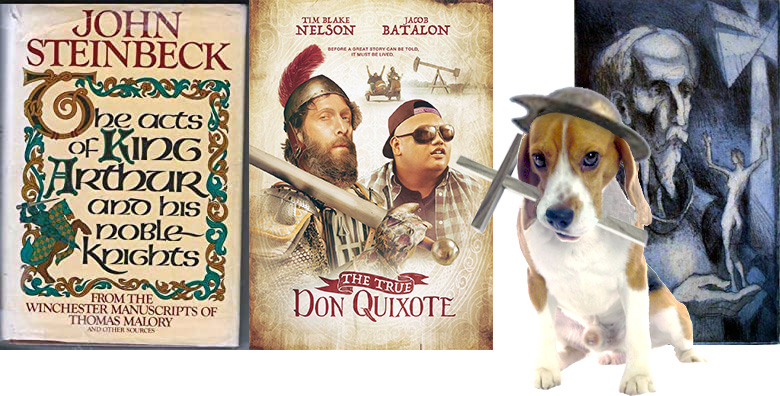
I’ve been saying for 20 years that I’m going to write a buddy movie about Jesus and the 12. I’ve got the whole thing in my head.
But who am I to put words in the mouth of Jesus? The idea of creating a fictional Jesus who does and says things that are not in the Bible could easily be the pinnacle of hubris.
I believe John Steinbeck was gripped by a similar fear. He and Elaine rented a cottage in England from 1956 to 1959 so that he could work on his 20th century update of Le Morte d’Arthur by Thomas Malory, along with his story of Don Quixote as an old man in California who has watched one-too-many many westerns on TV.
He explained his motive for Le Morte d’Arthur shortly before he left England.
“Malory wrote the stories for and to his time. Any man hearing him knew every word and every reference. There was nothing obscure, he wrote the clear and common speech of his time and country. But that has changed—the words and references are no longer common property, for a new language has come into being. Malory did not write the stories. He simply wrote them for his time and his time understood them … And with that, almost by enchantment the words began to flow…”
– John Steinbeck, from a letter dated March 27, 1959.
Steinbeck’s unfinished works, King Arthur and His Noble Knights and Don Keehan, Marshall of Manchon, are both amazing, and he never explained why he didn’t publish them. But having read everything Steinbeck ever wrote – including 50 years of his private correspondence published as A Life of Letters – I am convinced that John Steinbeck heard the same voice in his mind that I hear in mine, “Just who the hell do you think you are?”
But still, I remain committed to making my buddy movie about Jesus and the 12.
It occurred to me 2 years ago that I could save a lot of money on set design and costumes if I moved the story from Israel 2,000 years ago to the city of New Orleans today; interesting people in comfortable clothes in a colorful city.
Little did I know that Chris Poché already had my idea. But Chris didn’t discover his buddy movie in the Bible. Chris Poché, like John Steinbeck, saw a buddy movie in Don Quixote de La Mancha.
In a recent interview with Mike Rowe, Poché said,
“And when I started reading it, what struck me was that it’s not a big epic tale. It’s little. He never gets out of his neighborhood. He’s on this cruddy old horse that can’t go very far. He just rides around the neighborhood doing crazy crap. And I’m reading and thinking, ‘Well, that could happen to anybody, any place, any time. I don’t need the desert in Spain in 1605. I don’t need to see a monster through his eyes. That windmill was not a giant. That was the whole point. He’s nuts… Maybe I could just make this [movie] right here. Doesn’t matter where it is. Doesn’t matter what year it is. It could happen to anyone.’ Little did I know, at that moment it was happening to me.”
Chris Poché of New Orleans is what the cognoscenti of Wizard Academy call, “our brand of crazy.” And it is this special brand of craziness that has made Chris and a few dozen of his buddies an important part of Mardi Gras.
“Everyone in New Orleans is Don Quixote. Everyone. That stupid little Mardi Gras club happened because I looked at my buddy who is my accomplice in all things stupid. I looked at him and said, ‘Do you know what? We’re going to start one of these clubs, but we’re not marching, we’re riding around in power recliners dressed like lounge lizards.’ And he went, ‘Yeah.’ And eight months later, we were in the biggest parades because everyone here supports madness and Quixotic quests. Nobody looks at you like you’re crazy. They look at you like, ‘Hey, that’s a great idea.’ The stupider the better.”
Do you want to be my accomplice in something stupid? It would be irresponsible to call it a class, because a class has an educational agenda, something that will save you time or solve a problem or make you money. I don’t plan to do any of that. I’m just going to tell a bunch of stories and show some movie clips and answer a lot of interesting questions and eat a lot of good food and maybe have an adventure or two. Who knows.
But I can tell you that we will talk about Jesus and Don Quixote and John Steinbeck and String Theory and Hemingway’s Old Man and the Sea and I’ll share a few memories of the late Kary Mullis, the inventor of Polymerase Chain Reaction (PCR) and the winner of the Nobel Prize.
Kary, too, was our brand of crazy.
And somewhere along the way we’ll look into the science of creating magnetically attractive characters in fiction, and do some exercises that will help you create a more interesting brand, a more entertaining movie, a more widely-read book, a more effective ad; whatever it is you are doing that deserves more attention than it’s been getting.
Are you coming?
Roy H. Williams